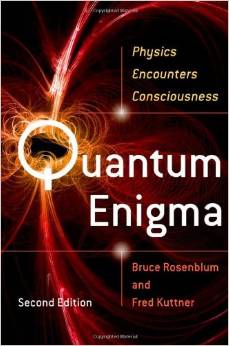By Peter Weigel
Quantum mechanics gives rise to striking interpretive puzzles and experimental paradoxes. Light or elementary units can test like particles or waves, depending on the experiment. Some properties of matter cannot be measured simultaneously. Heisenberg later posited objective indeterminacy. Einstein said that God does not play dice with the universe. Bohr replied that Einstein should not tell God what to do. Distant particles can seem oddly “entangled.” Some physicists ignore such oddities, or attribute them to macrocosmic instruments being up against microcosmic subtleties. Other physicists have suggested the observer’s consciousness or just observation may somehow directly effect experimental outcomes. By the 1930s, some already speculated on a universe with mind-dependent features. Critics weighed in. If ideas made things, noted philosopher of science Stanley Jaki observed, everyone would be an Einstein. Yet, within the range of views there was consensus that quantum oddities beckoned some interpretation. Physicists can thus sound like philosophers, and some philosophers like hard-nosed physicists.
In Quantum Enigma, two University of California-Santa Cruz physicists enter the interpretive fray to help the non-initiated explore key historical and philosophical resonances of the quantum revolution. The book arose from their physics course for liberal arts students. The authors aim to show that the experimental observer’s role warrants more attention than it normally gets, while they cautiously try to distinguish the demonstrable from more conjectural views. The first half traces the emergence of quantum mechanics between 1900-1930, introducing such major figures as Planck, Einstein, Bohr, Heisenberg, Schrödinger, and others. The authors patiently explain some of the paradoxes and how these major architects of the new physics interpreted and intensely debated them (noted above).
A middle chapter, “One Third of Our Economy,” underscores the practical side of quantum developments in products such as transistors, lasers, fiber optics, medical imaging, and future quantum computing. A chapter on entanglement and Bell’s Theorem explores possibilities for unusual interconnectivity in the universe. The authors then survey how ten different schools interpret the quantum world. All of them seem to have to grapple with the role of the conscious observer, if only in the modest sense that choice of experiment shapes what properties matter and energy display. The authors note that a further role for consciousness remains speculative, while also remaining the basis of a number of intriguing possibilities posed by physicists.
The last two chapters look at human consciousness and then recent cosmology. The authors believe human consciousness does not reduce to a purely materialist account. Experimental choice helps generate the paradoxes, and such choices involve human free will the authors believe. To this extent the authors see human consciousness and free will forming the crux of the quantum enigma, even if free will is hard to demonstrate beyond a conviction of having it. A good number of authors remain cautious on the kinds of inferences that seem warranted.
The final chapter, on cosmology, shows how quantum physics has contributed to a number of recent developments and theories–black holes, Big Bang, dark energy, universal expansion, and issues surrounding universal “fine tuning” and the Anthropic Principle. Quantum developments not only shifted the picture of the micro world, but also influenced modern views of where the universe came from and may be headed.
Writing for students and the uninitiated, the authors focus on the history of their subject and on illustrating the conundrums. Some readers may like longer coverage of other areas. But those teaching or writing on abstruse material realize the trade-offs. Quantum Enigma shows why contemporary educated minds should desire to know something about these scientific developments and their interpretation. The authors aid the liberal arts in offering non-specialists a glimpse into a seemingly distant world still much a part of us and our visible world.
Peter Weigel (ΦBK, Marquette University, 1989) is an associate Professor of philosophy at Washington College. Washington College is home to the Theta of Maryland Chapter of Phi Beta Kappa.




